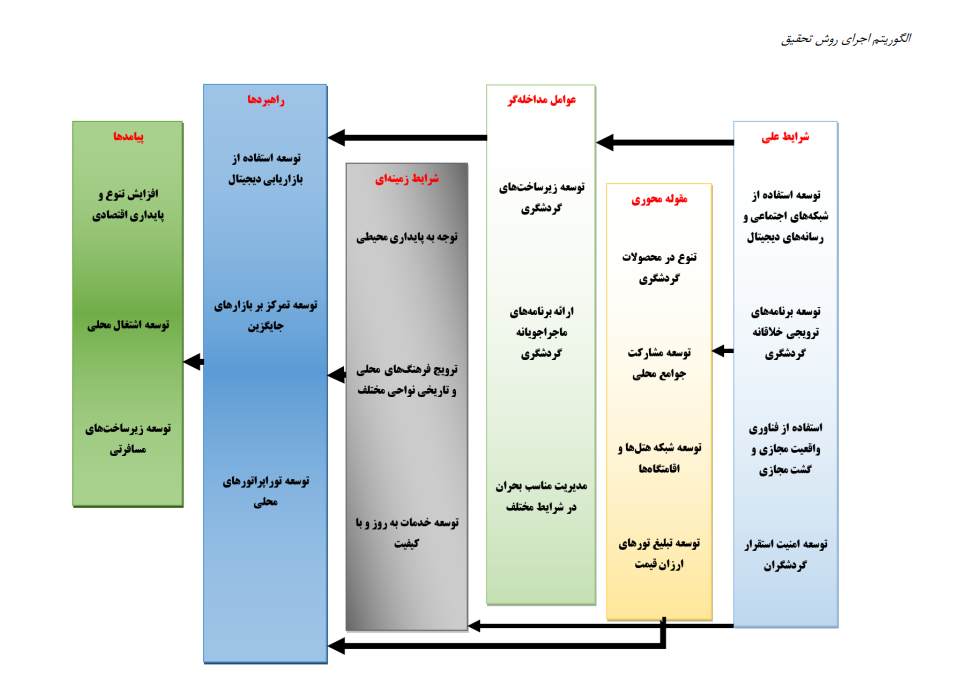Designing a Nature Tourism Marketing Model under Sanctions
Keywords:
Marketing, Nature Tourism, SanctionsAbstract
Iran, with its unique geostrategic location, climatic conditions, and unparalleled natural attractions, has the potential to become a major hub for nature tourism worldwide. Nature tourism globally is growing rapidly and is expected to constitute a significant portion of the tourism industry in the future. However, only 2.5% of the tourists who enter Iran are traveling for nature tourism purposes. The aim of this study is to design a nature tourism marketing model under sanctions. To achieve the design of this model, the study utilized a qualitative research method, specifically grounded theory by Strauss and Corbin. The statistical population of the study consists of experts and professors in commerce and management (brand management, marketing, management, etc.), from whom interviews were conducted. In order to collect data, in-depth interviews were used. The results showed that key causal conditions include the development of social networks and digital media usage, promotion of creative tourism programs, utilization of virtual reality technology and virtual tours, and the development of tourist safety measures. The core category involves the diversity of tourism products, development of local community participation, expansion of hotels and accommodation networks, and promotion of affordable tour options. Intervening factors are the development of tourism infrastructure, provision of adventurous tourism programs, and effective crisis management under different circumstances. Contextual conditions include emphasis on environmental sustainability, promotion of local and historical cultures in various regions, and development of quality, up-to-date services. Strategic initiatives involve developing digital marketing, focusing on alternative markets, and fostering local tour operators. The expected consequences of these strategies are increased economic diversity and sustainability, local employment development, and the enhancement of travel infrastructure.
Downloads
References
Bazgir, R., Sohrabi, R., Esalmbolchi, A., & Namamian, F. (2021). Presenting a Model for the Development of Ecotourism in Iran. Geography and Regional Urban Planning, 18(38), 45-62. https://gaij.usb.ac.ir/article_6038.html?lang=en
Dabival, P. F. (2022). The Importance of Tourism. Helsinki, Finland.
Hokm-Abadi, A. A., & Dowlat Abadi, A. (2020). Legal and Economic Analysis of the Impact of Sanctions on the Tourism Industry. Lawyer's Journal, 13, 123-148. http://ensani.ir/fa/article/428702/%D8%A8%D8%B1%D8%B1%D8%B3%DB%8C-%D8%AD%D9%82%D9%88%D9%82%DB%8C-%D9%88-%D8%A7%D9%82%D8%AA%D8%B5%D8%A7%D8%AF%DB%8C-%D8%AA%D8%A7%D8%AB%DB%8C%D8%B1-%D8%AA%D8%AD%D8%B1%DB%8C%D9%85-%D9%87%D8%A7-%D8%A8%D8%B1-%D8%B5%D9%86%D8%B9%D8%AA-%DA%AF%D8%B1%D8%AF%D8%B4%DA%AF%D8%B1%DB%8C
Liang, F. (2020). Promoting the Integrated Development and Path Optimization of Sports Industry and Tourism Industry. International Journal of Frontiers in Sociology, 2(9). https://francis-press.com/papers/3402
Masaeli, A., Alizadeh, R., & Derafshi, K. (2023). Scenarios for Ecotourism Development Based on the National Vision Document and a Foresight Approach (Case Study: Yazd Province). Sustainable Development of Geographical Environment, 10(8), 72-88. https://doi.org/10.1016/j.esd.2022.11.004
Naderi Dust, M., & Shojaei Bagheini, G. (2022). Designing a Marketing Model Based on Customer Experience in Ecotourism in Mazandaran Province. Sociological Researches, 15(3), 129-143. https://sanad.iau.ir/en/Article/867747?FullText=FullText
Pouya, A., Soltan Panah, H., Shafiei, R., & Irandoust, M. (2019). Designing a Marketing Model Based on Customer Experience in Ecotourism in Kurdistan Province. Tourism and Development, 25(20), 45-69. https://www.itsairanj.ir/article_96155.html
Rashidkalouei, H., Karimi Azari, A., & Pourreza, S. H. (2020). Evaluating the Creation of Child-Friendly City Components in the City of Bandar Anzali. Urban Studies Knowledge, 4(3), 51-65. https://upk.guilan.ac.ir/article_4060_en.html
Shir-Mohammadi, Y., Yazdan Panah, E., Takloo, F., & Yaghubi Pourfard, A. (2024). The Effect of Tourists' Experiences on Environmental Education through the Resonance of Ecotourism Destination Branding. Environmental Education and Sustainable Development, 16(39), 45-62. https://ee.journals.pnu.ac.ir/article_10327.html
Sobhani, P., & Danekar, A. (2023). Identifying Recreational Activities and Examining Spatial Indicators for Ecotourism Development in the Hara Protected Area. Tourism Management Studies, 12(61), 69-110. https://tms.atu.ac.ir/article_15777.html?lang=en
Taghavi, M., Safaei, P., & Kord, A. (2018). Examining the Effects of Tourism Growth on GDP (Case Study: Iran). Applied Economics, 8(27), 49-58. https://sid.ir/paper/202029/en
Zadmehr, H., Kazemi, A., Shakouri Ganjavi, H., Hossein Zadeh, M., & Hosseini, S. H. (2022). Designing a Model to Increase Revenue from the Provision of Tourism Services (A Systems Dynamics Approach). Tourism and Development, 19(32), 19-37. https://www.itsairanj.ir/article_135115.html

Downloads
Published
Submitted
Revised
Accepted
Issue
Section
License
Copyright (c) 2025 Mahboubeh Naderi Doust (Author); Mohammadreza Rostami; Seyed Hossein Hosseini, Mehdi Sanei (Author)

This work is licensed under a Creative Commons Attribution-NonCommercial 4.0 International License.










